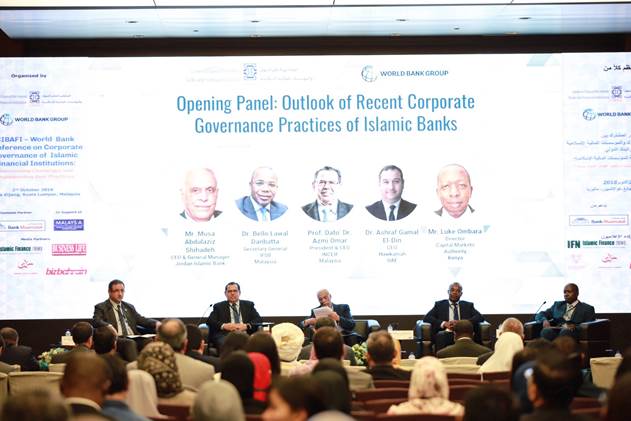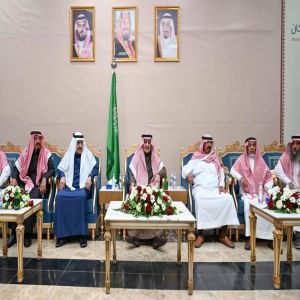| The General Council for Islamic Banks and Financial Institutions (CIBAFI), the global umbrella of Islamic financial institutions and the World Bank have successfully launched the 2nd CIBAFI – World Bank Conference on Corporate Governance of Islamic Financial Institutions: Overcoming Challenges and Implementing Best Practices that was held in Sasana Kijang, Kuala Lumpur, Malaysia.
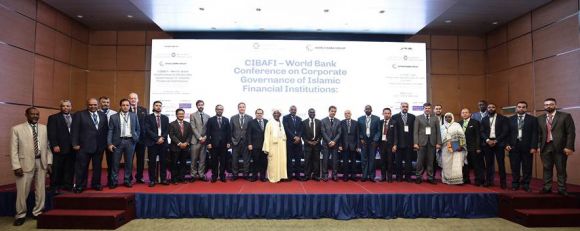
CIBAFI – World Bank Conference was organised in partnership with Bank Muamalat Malaysia Berhad and supported by Malaysia World's Islamic Finance Marketplace (Bank Negara Malaysia). It endeavoured to bring together leading Corporate Governance stakeholders from the Islamic finance industry, multilateral institutions, international and national regulatory bodies, policy-makers, and academia to discuss emerging issues and the best practices in light of recent Corporate Governance developments. The Conference was attended by more than 200 active delegates from 25 countries.
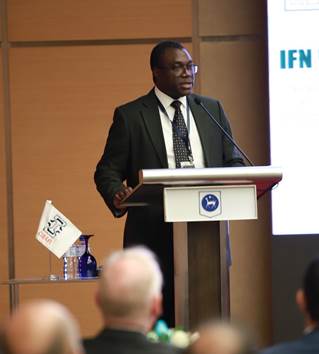
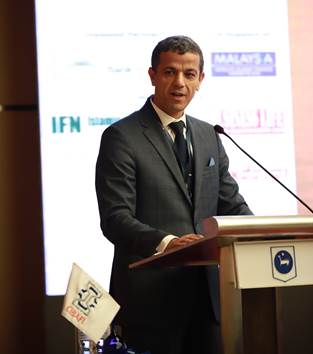
The welcoming remarks were presented by Mr. Abdelilah Belatik, Secretary General, General Council for Islamic Banks and Financial Institutions (CIBAFI); Mr. Abayomi Alawode, Lead Financial Sector Specialist & Head of Islamic Finance, the World Bank; Mr. Abdulhameed M. Aboumoussa, CIBAFI Deputy Chairman and Governor, Faisal Islamic Bank of Egypt; and Dato’ Haji Mohd Redza Shah Abdul Wahid, CIBAFI Board of Directors Member and Chief Executive Officer, Bank Muamalat Malaysia Berhad.
The conference has also witnessed a special Keynote Address that was delivered by H.E. Wimboh Santoso, Chairman of the Board of Commissioners, Financial Services Authority (OJK), Indonesia.
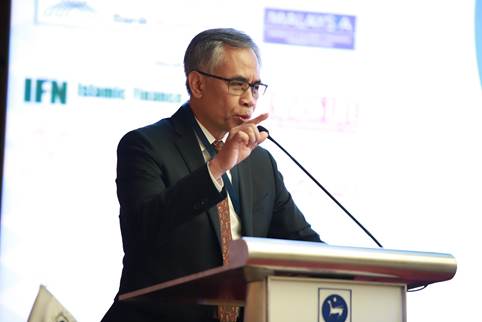
The opening panel, themed “Outlook of Recent Corporate Governance Practices of Islamic Banks” was chaired by Mr. Musa Abdulaziz Shihadeh, CIBAFI Board of Directors Member, Chief Executive Officer & General Manager, Jordan Islamic Bank, Jordan. Among the panelists who shared their valuable insights on this topic were: Dr. Bello Lawal Danbatta, Secretary General, Islamic Financial Services Board (IFSB), Malaysia; Prof. Dato’ Dr. Azmi Omar, President & Chief Executive Officer, International Centre for Education in Islamic Finance (INCEIF), Malaysia; Dr. Ashraf Gamal El-Din, Chief Executive Officer, Hawkamah - Institute of Corporate Governance, United Arab Emirates; and Mr. Luke Ombara, Director - Regulatory Policy & Strategy, Capital Markets Authority, Kenya.
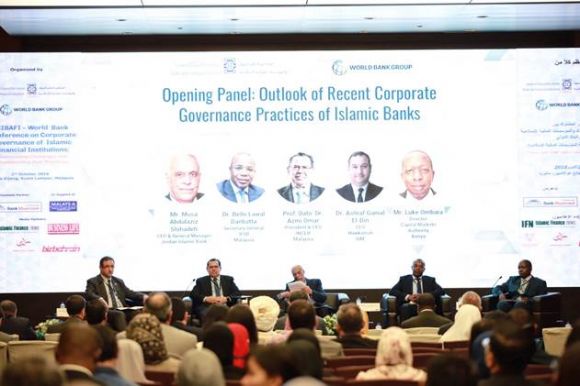
The first session themed “Board Effectiveness as a Major Issue of Corporate Governance Practices of Islamic Banks” was chaired by Mr. Nidal Barghouti, CIBAFI Board of Directors Member, and General Manager, Safa Bank, Palestine who facilitated the discussion among the session speakers. The session included Mr. Jalalullail Othman, Board Member & Head of Islamic Finance, CIMB Islamic Bank Berhad, Malaysia; Mr. Md. Mahbub-ul-Alam, Managing Director & Chief Executive Officer, Islami Bank Bangladesh Limited, Bangladesh; Mr. Nicholas Edmondes, Partner- International Department, Trowers & Hamlins, Malaysia; and Mrs. Amal Gasim Ahmed Mohammed, General Manager, Family Bank, Sudan. The session discussed among others the key challenges in the board structure and composition within Islamic financial institutions; the implication of ownership concentration on Islamic Finance Institutions business performance and expansion; and the appropriate accountability mechanisms to protect the rights of account holders and shareholders of IFI’s.
“Risk Management, Transparency and Reporting Requirements” was the main theme of the second session. Chairing this session was Mr. Gonzalo Rodríguez, General Coodinator, Saudi-Spanish Center for Islamic Economics and Finance (SCIEF), Spain, while the panelists included: Mr. Alhassan Abdulkarim, Regional Manager, Business Development, Jaiz Bank PLC, Nigeria; Mr. Abdul-karim Al-Sukari, Chief Risk Officer, Islamic International Arab Bank, Jordan; Mr. Nik Shahrizal Sulaiman, Partner, PwC Malaysia; and Mr. Muhamad Shukri Abdullah, Associate Director – Accreditation Development, Finance Accreditation Agency, Malaysia. The session presented the degree of compliance of the reporting practices of IFI’s with International Financial Reporting Standards (IFRS) and AAOIFI standards, and shared some insights on Cyber Security and Governance trends, principles and awareness.
The conference was concluded with the third session titled “Shariah Governance” which was chaired by Dr. Saad Bakkali, Manager - Higher Shariah Authority, Central Bank of the United Arab Emirates. Among the distinguished scholars who presented their expertise were Prof. Dr. Zulkarnain Muhamad Sori, Professor, International Centre for Education in Islamic Finance (INCEIF), Malaysia; Dr. AbdelGadir Warsama Ghalib, Principal Legal Counsel, Kingdom of Bahrain; Dr. Ali Al Sartawi, Shariah Board Member, Palestine Islamic Bank, Palestine; and Dr. Mohamed Karrat, Associate Director, Al Maali Group, Morocco. This session’s discussion topics focused on the role and structures of Shariah Supervisory Boards (SSB) in the light of strengthening regulatory regimes; the accountability and independence of SSB; and aligning SSB and the BOD towards greater synchronization and harmony. The session has also witnessed an interesting sharing of case studies and best practices in Shariah Governance.
The conference was organised as part of the MOU signed between CIBAFI and the World Bank that aims to reinforce both CIBAFI’s and the World Bank’s commitment to help foster the development of Islamic finance globally including in the developing markets in the area of Corporate Governance.
“Risk Management, Transparency and Reporting Requirements” was the main theme of the second session. Chairing this session was Mr. Gonzalo Rodríguez, General Coodinator, Saudi-Spanish Center for Islamic Economics and Finance (SCIEF), Spain, while the panelists included: Mr. Alhassan Abdulkarim, Regional Manager, Business Development, Jaiz Bank PLC, Nigeria; Mr. Abdul-karim Al-Sukari, Chief Risk Officer, Islamic International Arab Bank, Jordan; Mr. Nik Shahrizal Sulaiman, Partner, PwC Malaysia; and Mr. Muhamad Shukri Abdullah, Associate Director – Accreditation Development, Finance Accreditation Agency, Malaysia. The session presented the degree of compliance of the reporting practices of IFI’s with International Financial Reporting Standards (IFRS) and AAOIFI standards, and shared some insights on Cyber Security and Governance trends, principles and awareness.
The conference was concluded with the third session titled “Shariah Governance” which was chaired by Dr. Saad Bakkali, Manager - Higher Shariah Authority, Central Bank of the United Arab Emirates. Among the distinguished scholars who presented their expertise were Prof. Dr. Zulkarnain Muhamad Sori, Professor, International Centre for Education in Islamic Finance (INCEIF), Malaysia; Dr. AbdelGadir Warsama Ghalib, Principal Legal Counsel, Kingdom of Bahrain; Dr. Ali Al Sartawi, Shariah Board Member, Palestine Islamic Bank, Palestine; and Dr. Mohamed Karrat, Associate Director, Al Maali Group, Morocco. This session’s discussion topics focused on the role and structures of Shariah Supervisory Boards (SSB) in the light of strengthening regulatory regimes; the accountability and independence of SSB; and aligning SSB and the BOD towards greater synchronization and harmony. The session has also witnessed an interesting sharing of case studies and best practices in Shariah Governance.
The conference was organised as part of the MOU signed between CIBAFI and the World Bank that aims to reinforce both CIBAFI’s and the World Bank’s commitment to help foster the development of Islamic finance globally including in the developing markets in the area of Corporate Governance.


 كسوة الكعبة المشرفة
كسوة الكعبة المشرفة الفيصل يضخ المياه العذبة ويؤسس للجامعات في محافظات المنطقة / نبراس - إنتصار عبدالله
الفيصل يضخ المياه العذبة ويؤسس للجامعات في محافظات المنطقة / نبراس - إنتصار عبدالله تصحيح أوضاع 249 ألف برماوي خلال عامين أطلقها الأمير خالد الفيصل عام 1434هـ
تصحيح أوضاع 249 ألف برماوي خلال عامين أطلقها الأمير خالد الفيصل عام 1434هـ